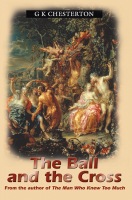The Ball And The Cross
G K Chesterton
Description:
Evan MacIan is a passionate and fiery young Catholic. He is outraged one day by an editorial he reads in 'The Atheist' and vents his anger by smashing the window of the paper’s office. He then challenges the editor, Turnbull, to a duel. The feuding men are thwarted at every turn in their attempt to find a suitable place for their fight. While the search goes on they continue their theological debate. They eventually arrive at a position of acceptance and mutual understanding before the story reaches its powerful conclusion.
Author biography:
G K Chesterton GK Chesterton was born in London in 1874 and educated at St Paul’s School, before studying art at the Slade School. In 1896, he began working for the London publisher, Redway, and also T. Fisher Unwin as a reader where he remained until 1902. During this time he undertook his first freelance journalistic assignments, writing art and literary reviews. He also contributed regular columns to two newspapers: ‘The Speaker’ (along with his friend Hilaire Belloc) and the ‘Daily News’. Throughout his life he contributed further articles to journals, particularly ‘The Bookman’ and ‘The Illustrated London News’.His first two books, poetry collections, were published in 1900. These were followed by collections of essays and in 1903, and his most substantial work to that point, a study of ‘Robert Browning’. Chesterton's first novel, 'The Napoleon of Notting Hill' was published in 1904. In this book he developed his political attitudes in which he attacked socialism, big business and technology and showed how they become the enemies of freedom and justice. These were themes which were to run throughout his other works. 'The Man who was Thursday' was published in 1908 and is perhaps the novel most difficult to understand, although it is also his most popular. 'The Ball and the Cross' followed in 1910 and 'Manalive' in 1912. Chesterton's best-known fictional character appears in the Father Brown stories, the first of the collection, 'The Innocence of Father Brown', being published in 1911. Brown is a modest Catholic priest who uses careful psychology to put himself in the place of the criminal in order to solve the crime.
His output was prolific, with a great variety of books from brilliant studies of ‘Dickens’, ‘Shaw’, and ‘RL Stevenson’ to literary criticism. He also produced more poetry and many volumes of political, social and religious essays. Tremendous zest and energy, with a mastery of paradox, puns, a robust humour and forthright devotion along with great intelligence characterise his entire output. In the years prior to 1914 his fame was at its height, being something of a celebrity and seen as a latter day Dr Johnson as he frequented the pubs and offices of Fleet Street. His huge figure was encased in a cloak and wide brimmed hat, with pockets full of papers and proofs.
Chesterton came from a nominally Anglican family and had been baptized into the Church of England. However, at that point he had no particular Christian belief and was in fact agnostic for a time. Nevertheless, in his late twenties he began to explore the possibility of a religious belief for himself, which he then discovered already existed as orthodox Christianity. In 1896, he had also met Frances Alice Blogg, marrying in 1901. She was a devout Anglican and her beliefs strengthened his Christian convictions. In 1922 he converted to Catholicism and he explores his belief in many works, the best known of which is 'Orthodoxy', his personal spiritual odyssey. In some ways, 'Orthodoxy' was an answer to earlier criticisms received after the 1905 publication of 'Heretics', which was a collection of studies of the then contemporary writers. The complaint was made that Chesterton discussed these writers’ attitudes to life, but offered nothing in respect of himself. He was an ebullient character, absent-minded, but quick-witted and will be remembered as one of the most colourful and provocative writers of his day.
G.K. Chesterton died in 1936.



